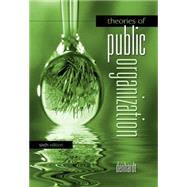
| Preface | p. ix |
| About the Author | p. xiii |
| Learning about Public Organizations | p. 1 |
| The Acquisition of Knowledge | p. 2 |
| Formal Theories of Public Organization | p. 9 |
| Building Theories of Public Organization | p. 11 |
| Focusing on Complex Organizations | p. 14 |
| Redefining the Field | p. 16 |
| Conclusion | p. 17 |
| Discussion Questions | p. 18 |
| Cases | p. 18 |
| References and Additional Readings | p. 19 |
| The Intellectual Heritage: Marx, Weber, and Freud | p. 20 |
| Transition to Socialism | p. 22 |
| Industrial Organization and Individual Development | p. 23 |
| Growth of Alienation | p. 24 |
| Max Weber | p. 26 |
| Rationalization of Social Theory: The Notion of the "Ideal Type" | p. 27 |
| Sigmund Freud | p. 31 |
| What Can We Learn? | p. 35 |
| Conclusion | p. 38 |
| Discussion Questions | p. 39 |
| Cases | p. 39 |
| References and Additional Readings | p. 39 |
| The Political Heritage: From Wilson to Waldo | p. 41 |
| Beginnings of Public Administration Theory | p. 42 |
| Politics-Administration | p. 45 |
| The Lingering Influence of Politics-Administration | p. 49 |
| Adopting Business Management Techniques | p. 51 |
| Scientific Approaches to Management | p. 52 |
| Administrative Management and Organizational Structure | p. 57 |
| Centralization and Integration | p. 58 |
| Efficiency: The Key Measure of Success | p. 63 |
| Democratic Administration | p. 65 |
| Conclusion | p. 67 |
| Discussion Questions | p. 68 |
| Cases | p. 68 |
| References and Additional Readings | p. 69 |
| The Rational Model of Organization | p. 71 |
| A Science of Human Behavior | p. 71 |
| The Generic Approach to Administration | p. 72 |
| The Proverbs of Administration | p. 73 |
| The Rational Model of Administration | p. 76 |
| Decision Making and Policy Formulation | p. 81 |
| Closed Systems versus Open Systems | p. 86 |
| Conclusion | p. 90 |
| Discussion Questions | p. 91 |
| Cases | p. 91 |
| References and Additional Readings | p. 91 |
| Organizational Humanism and the New Public Administration | p. 93 |
| Themes in Organizational Humanism | p. 94 |
| Personality and Organization | p. 98 |
| Organization Development in the Public Sector | p. 102 |
| The New Public Administration | p. 106 |
| Conclusion | p. 113 |
| Discussion Questions | p. 114 |
| Cases | p. 114 |
| References and Additional Readings | p. 114 |
| The Policy Emphasis and the New Public Management | p. 117 |
| Development of the Public Policy Orientation | p. 118 |
| Responsiveness in Public Policy | p. 121 |
| Effectiveness in Public Policy | p. 130 |
| The Discovery of Policy Implementation | p. 133 |
| Methods of Policy Analysis | p. 136 |
| The Intellectual Crisis | p. 138 |
| The New Public Management | p. 141 |
| Conclusion | p. 149 |
| Discussion Questions | p. 149 |
| Cases | p. 150 |
| References and Additional Readings | p. 150 |
| Public Administration and the New Public Service | p. 155 |
| A Critique of the Rational Model | p. 157 |
| Interpretive/Action Theory | p. 163 |
| Critical Social Theory | p. 167 |
| Discourse and Post-Traditional Public Administration | p. 173 |
| The New Public Service | p. 182 |
| Outlining the New Public Service | p. 190 |
| Democratic Network Governance | p. 193 |
| Conclusion | p. 197 |
| Discussion Questions | p. 197 |
| Cases | p. 198 |
| References and Additional Readings | p. 198 |
| The Practitioner as Theorist | p. 205 |
| Theories and Theory Building | p. 206 |
| Toward Theories of Public Organization | p. 208 |
| Organizational and Personal Learning | p. 212 |
| A New Role for Theorists | p. 214 |
| Conclusion | p. 215 |
| Discussion Questions | p. 216 |
| Cases | p. 216 |
| References and Additional Readings | p. 216 |
| Appendix | p. 218 |
| The Administrative Journal | p. 218 |
| The Journal Format | p. 220 |
| Working in the Administrative Journal | p. 223 |
| Examples of Journal Entries | p. 224 |
| Credits | p. 227 |
| Name Index | p. 228 |
| Subject Index | p. 232 |
| Table of Contents provided by Ingram. All Rights Reserved. |
The New copy of this book will include any supplemental materials advertised. Please check the title of the book to determine if it should include any access cards, study guides, lab manuals, CDs, etc.
The Used, Rental and eBook copies of this book are not guaranteed to include any supplemental materials. Typically, only the book itself is included. This is true even if the title states it includes any access cards, study guides, lab manuals, CDs, etc.